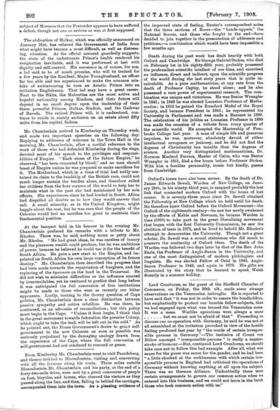Oxford's losses have also been severe. By the death of
Dr. James Edwards Sewell, Warden of New College, on Janu- ary 29th, in his ninety-third year, is snapped probably the last link that connected modern Oxford with the home of lost causes. It is seventy-three years since Dr. Sewell obtained the Fellowship at New College which he held until his death. He therefore knew Oxford before the Oxford Movement—the Oxford of the eighteenth century—he saw her newly awakened by the efforts of Keble and Newman, he became Warden in time (1860) to take part in the great liberalising movement that began with the first University Commission, he saw the abolition of tests in 1871, and he lived to behold Mr. Rhodes's attempt to democratise the University. Though not a great scholar, Dr. Sewell was a sound statesman who did much to preserve the continuity of Oxford ideas. The death of the Warden was followed two days later by that of the Rev. John Earle, the Professor of Anglo-Saxon in the University, and one of the most distinguished of modern philologists and linguists. He was elected Fellow of Oriel in 1848, Anglo- Saxon Professor in 1849, and again in 1876. His gifts are illustrated by the story that he learned to speak, Welsh fluently in a summer holiday.










































 Previous page
Previous page